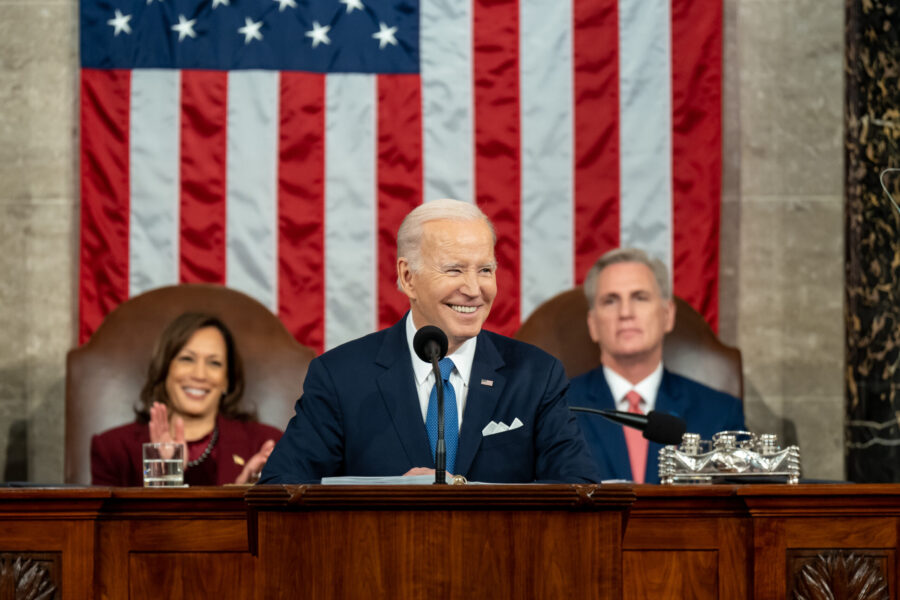Biden Prioritizes Mental Health in 2023 State of the Union
In his State of the Union address on February 7, 2023, President Biden outlined several priorities around mental health. Excerpts from The White House Briefing Room Fact Sheet that relate to youth mental health follow.
Tackling the Youth Mental Health Crisis
Mental health has become a crisis for Americans on the whole, and youth in particular. “Forty percent of American adults report symptoms of anxiety and depression, and the percent of children and adolescents with anxiety and depression has risen nearly thirty percent.”
In response, President Biden’s Mental Health Strategy, announced last year, has three main objectives: supporting Americans by creating healthy environments, strengthening system capacity, and connecting more Americans to care.
Creating Healthy Environments
Specifically, the Biden-Harris Administration will work to:
- Protect kids online. There is a growing body of “evidencethat social media and other tech platforms can be harmful to mental health, wellbeing and development,” and “children, adolescents, and teens are especially vulnerable to such harm.” According to a Pew Research report, “more than one-third of American teens say they use a major social media platform “almost constantly” and that they spend “too much time on social media.” It is frequently the case that social media platforms do not enforce the age limits that govern their terms of service, and younger and younger children are experiencing social media harms. Once online, children are prey to advertisers’ data collection, sexual predation, and cyberbullying. In the name of “user engagement,” social media platforms design their products to promote addictive and compulsive use of their products by minors.
- Building on Surgeon General Vivek Murthy’s Youth Mental Health Advisory, the Department of Health and Human Services’ new Center of Excellence on Social Media and Mental Wellness, and the recent passage of the Children and Media Research Advancement Act, the administration will work to ensure providers prioritize young people’s privacy, safety, and emotional wellbeing over profit.
- Promote youth resilience. While rates of anxiety, depression, and self-harm have risen among the youth population, there are also remarkable stories of hope and resilience to share. To that end, HHS will launch a new Children and Youth Resilience Prize Challenge, awarding a total of $750,000 in a new pilot program.
Strengthening System Capacity
Exacerbating the mental health crisis is a severe shortage of professionals in the behavioral health workforce. Congress has passed legislation that creates 350 new slots to help train the next generation of mental health professionals. In addition, the Administration will:
- Recruit diverse candidates to the mental health profession. To address the disparity in mental health professionals of color, “HHS will increase funding to recruit future mental health professionals from Historically Black Colleges and Universities (HBCUs) and to expand the Minority Fellowship Program.”
Connecting More Americans To Care
The Biden-Harris Administration is committed to:
- Improve school-based mental health. The Department of Education (ED) plans to announce “more than $280 million in grants to increase the number of mental health care professionals in high-need districts and strengthen the school-based mental health profession pipeline.” HHS and ED intend to “remove red tape for schools, making it easier for them to provide health care to students and more easily bill Medicaid funding for these critical services.”
- Enhance crisis services.In 2022, the Biden-Harris Administration launched 988, the easy-to-remember National Suicide & Crisis Lifeline, in 2022, making it easier for individuals experiencing a behavioral health crisis to receive care.
These priorities build on those mentioned in last year’s State of the Union. Since then, the Biden-Harris Administration has made significant progress on expanding access to mental health services and treatment for substance use.
- “President Biden signed into law the Bipartisan Safer Communities Act, which makes unprecedented investment in youth mental health and supports school-based health services.”
- “The Administration also oversaw the successful transition to 988, the National Suicide & Crisis Lifeline, investing over $500 million to strengthen 988 infrastructure and grow local crisis-center capacity – a twenty-fold increase over the prior administration.”
- The Administration also encouraged states to better address youth mental health for those with Medicaid coverage.
Read the Fact Sheet from The White House Briefing Room here.
Read the full remarks by President Biden in the State of the Union Address here.



